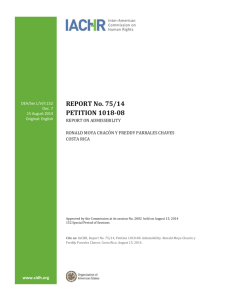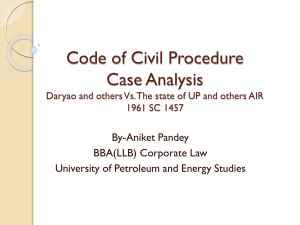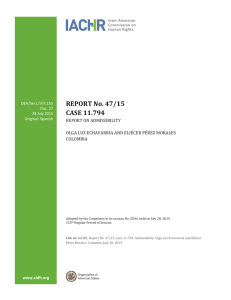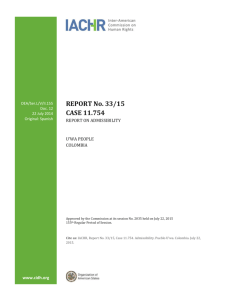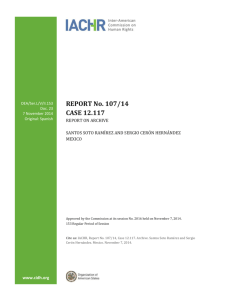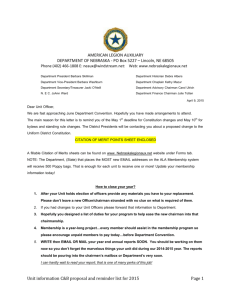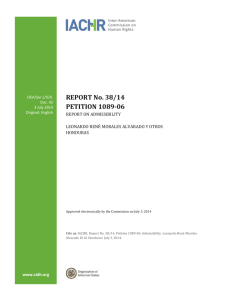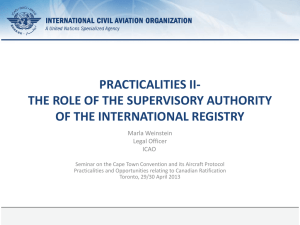Report No. 35/14
advertisement
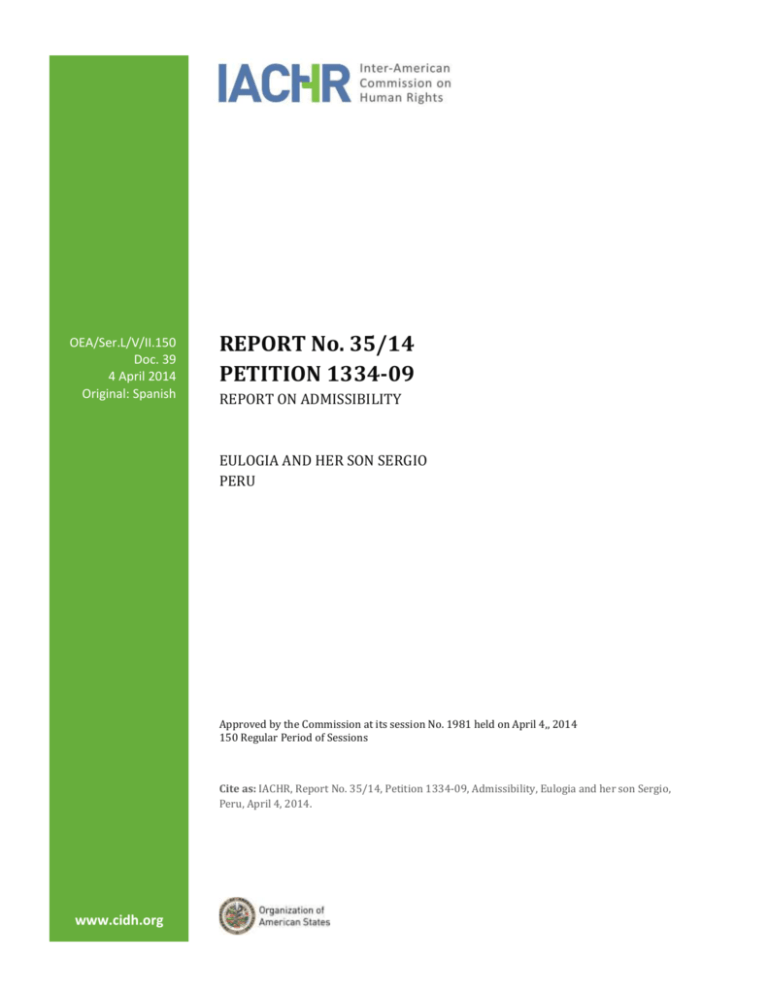
OEA/Ser.L/V/II.150 Doc. 39 4 April 2014 Original: Spanish REPORT No. 35/14 PETITION 1334-09 REPORT ON ADMISSIBILITY EULOGIA AND HER SON SERGIO PERU Approved by the Commission at its session No. 1981 held on April 4,, 2014 150 Regular Period of Sessions Cite as: IACHR, Report No. 35/14, Petition 1334-09, Admissibility, Eulogia and her son Sergio, Peru, April 4, 2014. www.cidh.org REPORT NO. 35/14 PETITION P-1334-09 ADMISSIBILITY EULOGIA AND HER SON SERGIO1 PERU APRIL 4, 2014 I. SUMMARY 1. On October 27, 2009, the Inter-American Human Rights Commission (hereinafter, “the Commission,” “the Inter-American Commission,” or “the IACHR”) received a petition submitted by the Vicaría de Solidaridad de la Prelatura de Sicuani [Vicarage of Solidarity of the Prelature of Secuani] (agency of the Catholic Church), in representation of Mrs. Eulogia and the child Sergio Jesús (hereinafter, “the petitioners”), alleging the responsibility of the Republic of Peru (hereinafter, “the State,” “the Peruvian State,” or “Peru”) for the purported violation of rights enshrined in the American Convention on Human Rights (hereinafter “the Convention” or “the American Convention”) to the detriment of Eulogia, Sergio and their family. 2. The petitioners have alleged that the Peruvian State is responsible for the inadequate medical care Mrs. Eulogia received at a public clinic during and after delivery, which led to her child, Sergio Jesús, being dropped at the moment he was born. As a result, Sergio Jesús, age 10 at the time this report was drafted, was severely disabled, physically, intellectually and sensorially, in addition to suffering pain and chronic convulsions. They have alleged that since the child was born they have not received appropriate medical attention to treat his condition and that the criminal proceedings brought were ineffective. In light of the foregoing, they have alleged a violation of guarantees of judicial protection, provided for under Article 25 of the Convention and violation of the right to health protected under Article 10 of the Additional Protocol to the American Convention on Human Rights in the Area of Economic, Social and Cultural Rights (hereinafter, “the Protocol of San Salvador”). 3. For its part, the State has requested that the Commission declare the petition inadmissible because it is [seeking] a fourth instance, inasmuch as the situation had already been investigated and ruled on by domestic court and because the petition has come about as a result of the petitioner’s disagreement with the ruling of the Superior Court of Justice of Cusco in proceedings in which all judicial guarantees had been ensured. Additionally, the State has alleged that the petitioner has not exhausted all domestic remedies aimed at ensuring reparations through civil proceedings, as the petitioner should file a civil suit for damages. The State added that it is currently providing the alleged victims medical treatment through the Comprehensive Health Service [Servicio Integral de Salud] program. 4. Without prejudging the merits of the complaint, after having analyzed the position of the parties and fulfillment of the requirements stipulated in Articles 46 and 47 of the American Convention, the Commission has decided to declare the case admissible for purposes of reviewing the claim with regard to purported violations of rights enshrined in Article 4, 5, 8, 19, 25, and 26 of the American Convention in relation to Article 1(1) thereof, and Article 7 of the Inter-American Convention on the Prevention, Punishment and Eradication of Violence against Women in relation to Article 24 of the American convention. The Commission has further decided to notify the parties and order publication of the report in its Annual Report to the OAS General Assembly. II. PROCESSING BY THE COMMISSION 5. On October 2, 2009, the petitioners lodged a petition that was registered under No. P-1334-09. The petition was forwarded to the Peruvian State on October 12, 2010, granting the State two months to submit its observations in keeping with the provisions of Article 30(2) of the IACHR’s Rules of Procedure. 1As Sergio is a child, the IACHR has decided not to publish their names in order to protect his identity. 2 6. The Commission received observations from the State on June 13, 2011, which were sent to the petitioners on August 8, 2011. The petitioners submitted their observations on January 5, 2012, which were forwarded to the State on May 22, 2012. The Commission received observations from the State on August 29, 2013. The petitioners presented additional information on April 4, 2013. All communications were duly transmitted. III. POSITION OF THE PARTIES A. Position of the Petitioners 7. The petitioners have alleged that on August 10, 2003, between 6 and 8 in the evening, Mrs. Eulogia, an indigenous Quechua woman belonging to the campesina community of Layme in the Cusco region, was taken from her home to the Public Health Center of the Yanaoca District because she presented symptoms of going into labor. The petitioners state that her partner, Jaime, the obstetrician, Marina Aguilar Tacusi, and a man and a woman who were medical assistants, also rode in the ambulance. 8. The petitioners have stated that they arrived at the Yanaoca Health Center around 8:20 in the evening and the obstetrician, Marina Aguilar, took the couple to the delivery room, where she laid Mrs. Eulogia down, telling her she would soon return. The petitioners have further stated that the obstetrician had gone home to get a coat, leaving Mrs. Eulogia alone with her husband in the room and not returning until after the birth. 9. The petitioners have alleged that as the labor pains became increasingly intense and frequent, Jaime went to the hall to yell for help from medical personnel, but he found no one. Upon return to the room, Mrs. Eulogia had felt the need to urinate and asked her partner to give her the bedpan and help her squat down. At that point she felt the baby’s head coming out of her vagina, and therefore asked her partner to look for someone to help them. The petitioner began to scream, “I am giving birth.” 10. The petitioners have recounted that at that point Jaime once again went to the hall yelling for someone to help them. After a few moments, a nurse name Gladys Limachi Queso came to the delivery room, and seeing Eulogia squatting down proceeded to raise her up. The petitioners have stated that Mrs. Eulogia begged the nurse not to raise her up, that the baby was coming out and that she should help her give birth in that position; however, the nurse grabbed Mrs. Eulogia’s arm and told her partner to do the same in order to hoist her up on the bed that was almost a meter high. At that moment the baby was born, violently crashing into the cement floor, hitting his head and cutting the umbilical cord. 11. The petitioners have alleged that the nurse took the unconscious child from the floor while she yelled for the rest of the medical personnel, who at that point appeared in order to attend to the newborn who was not crying or moving. 12. The petitioners have recounted that the next day at 10 a.m. the child and mother were driven to the Cusco Regional Hospital, 70 kilometers away, where they arrived around 12 noon. According to Eulogia, she was accompanied in the ambulance by a person known as “the tooth-puller,” a medical assistant and medical intern. The petitioners have contended that the child was admitted, but the mother was not immediately treated at the hospital entrance, although bleeding and with a uterus that was 10-centimeters dilated, because the proper papers had not been sent. The petitioners have submitted the evaluation report from Cusco Regional Hospital, which indicated that the woman [Eulogia] was “brought by Yanaoca health personnel, without having notified the obstetric center’s team, abandoning the patient without reporting either her physical condition or the aforementioned patient’s method of delivery, or the comprehensive health system SIS [sic].” The petitioners have stated that Jaime had had to return to their province, two hours away by car, in order to find said papers. 13. As for the newborn, the petitioners have indicated that he was admitted to the hospital for approximately two weeks, without favorable results. The petitioners have stated that the child currently suffers from irreversible cortical blindness due to brain damage, hypoxic-ischemic encephalopathy due to traumatic brain injury at birth, and for this reason the child convulses constantly, cannot speak, see or walk, uses diapers, cries non-stop as if he were suffering and is on his mother’s back most of the time. 3 14. The petitioners have recounted that on August 27, 2003, the baby’s parents went to the Yanaoca Health Center so the doctor could follow up on Sergio’s health condition, but the nurse Gladys Limachi Queso had closed the entrance door on them and had yelled vulgar and humiliating words at them, even threatening Jaime, telling him that he was very young and might at some point need the services of the Health Center. As a result of the foregoing, the petitioners have stated that the couple left with tears in their eyes, had felt completely humiliated, helpless and fearful of returning to the health center. The petitioners have stated that the child has not received appropriate medical care and has only been given analgesics when he has had a fever. They have further stated that the child has received no treatment to relieve his pain, nor has he received physical therapy or evaluation. 15. The petitioners have stated that the child’s parents went to the Yanaoca Provincial Human Rights Commission to lodge a complaint on September 4, 2003. They have added that the police investigation began on September 1, 2003, and the judicial investigation on October 30, 2003. 16. The petitioners have indicated that on September 5, 2006, the Public Ministry brought charges against Gladys Limache Queso, Frida Delgado Montesinos, Marina Aguilar Tacusi, Juan Carlos Peláez Zegarra and Alberto Heber Zamolla Triveño for the crime of aggravated endangerment or neglect of persons in danger to the detriment of Eulogia y Sergio. 17. According to the information provided by the petitioners, the Canas Mixed Jurisdiction Court [Juzgado Mixto de Canas] heard the joint criminal case against the defendants, brought under case No. 105-2003. In said proceedings, the decision to indict Frida Delgado Montesinos was withdrawn due to a lack of evidence, and Gladys Limache Queso’s sentence was not read in the defendant’s absence. The Canas Mixed Jurisdiction Court handed down 3 convictions, the first on December 11, 2008, of Juan Carlos Peláez Zegarra; the second, on December 22, 2008, of Alberto Heber Zamalloa; and the third, on December 29, 2008, of Marina Aguilar Tacusi, for the crimes of neglect of a minor or impaired individual in a situation of grave and imminent harm to their health, followed by grievous bodily harm. 18. The petitioners have provided information indicating that the judgment of December 11, 2008 was appealed and the Superior Court of Justice of Cusco handed down a judgment in the second instance on March 23, 2009, acquitting the four defendants as the Court considered that the wording of the punishable conduct—“expose [to danger]” and “neglect”—required willful intent [actuación dolosa] in which the agent must knowingly and willfully expose and neglect the person in the face of a specific danger, which had not been shown. 19. The petitioners have alleged they filed an appeal for annulment of the acquittal, but said appeal was rejected on April 30, 2009 and notified on May 8 of that same year. In this respect, the petitioners have contended that although Peruvian law states that summary proceedings are to last 180 days, in this case there was an unjustified delay as the proceedings lasted a total of five years and six months. The petitioners have stated that in the appeal the Court had not given value to significant evidence such as the obstetrician’s administrative penalty memorandum, which highlighted her direct responsibility in the events for having neglected Eulogia. The petitioners have provided information indicating that the visual inspection took place on January 22, 2004, four months after the complaint was filed. In the inspection report provided by the petitioners, it states that the Yanaoca Health Center measured less than 300 square meters, was one sole story and had insufficient space for the functioning of the administrative offices, examining rooms, and inpatient wards. Additionally, the aforementioned report states that there were old blood stains on the walls, that the place showed a lack of cleanliness and asepsis, and lacked water service. 20. The petitioners have also claimed that the State has the obligation to provide for the necessary mechanisms to punish those responsible for an unlawful act, and may not hide behind the excuse of an inadequate description of a criminal offense in order to acquit those responsible and perpetrate [sic] impunity. 21. The petitioners have alleged that the Peruvian State incurred international responsibility for failing to offer the conditions and guarantees for the safe delivery of Eulogia, who belongs to one of the most vulnerable groups of Peru, as she is a poor, indigenous, campesina woman. The petitioners have highlighted that 4 this negligence gave rise to serious and permanent injury to the child Sergio’s personal integrity and that the State did not punish the persons responsible for such acts, nor have they provided comprehensive reparations to the victims, despite involving public health services. 22. Additionally, the petitioners have contended that the State has not taken the necessary steps to ensure the child’s access to the best health possible through specialized care in line with his current condition. Although the child is covered by the Comprehensive Health System, this is a general system for the population that lives in extreme poverty and is not a specific response to Sergio Jesús’ case. According to Eulogia, in 10 years she has not received even one pill for the child’s convulsions and when she goes to the health center she is only given vitamins or amoxicillin if the child has a fever. 23. For the foregoing reasons, the petitioners consider that the Peruvian State is responsible for the violation of the rights protected under Article 25 of the American Convention and Article 10 of the Additional Protocol to the American Convention on Human Rights in the Area of Economic, Social and Cultural Rights. B. Position of the State 24. The State has alleged that the petition is inadmissible in keeping with Article 47(b) of the American Convention as it fails to describe facts that may constitute a violation of rights guaranteed under said Convention. In this regard, the State has argued that a domestic investigation was carried out, which complied with the guarantees of due process and concluded with a final judgment. The State has indicated that although the results were unfavorable for the appellants, this does not mean a violation of judicial protection has taken place. 25. As a result of the foregoing, the State has alleged that to seek to have the IACHR review said domestic ruling would mean that the Commission is undertaking the role of a fourth instance and that this is not within its remit, nor in keeping with its competencies. The State has emphasized that the Inter-American Human Rights System is of a supplemental, subsidiary and supporting nature, and in accordance with the competencies conferred on its oversight bodies, among those the Inter-American Commission, such bodies may not act as a fourth instance. 26. The State has highlighted that it is not the competence of the Commission to review domestic court rulings, judgments, decisions, or similar, nor may it question the assessment criteria that judicial bodies apply in the cases that go forward in proper proceedings that respect the guarantees of due process provided for in the Peruvian Constitution and the American Convention. 27. The State has indicated that the criminal proceedings that were brought based on the facts in question concluded with a judgment issued by the Cusco Superior Court of Justice, Decentralized and Itinerant Mixed Courtroom of Canchis-Sicuani on March 23, 2009, which overturned the first instance judgment convicting the defendants and providing for payment of civil reparations. The State has further indicated that the main consideration of the Court in overturning the conviction was that the facts of the case revealed no willful intent [dolo] on the part of the defendants. 28. The State has added that the petitioners had ready access to the remedies provided for under the domestic legal system in order to act in said proceedings, and at the same time has pointed out that the defendants are entitled to the same right. Indeed, this is why the defendants lodged an appeal, which was decided in their favor. The State has argued that it is unviable for the Commission to be questioning legal opinions and considerations that the national court held when deciding to acquit the defendants of criminal liability. 29. Additionally, the State has alleged that the petitioners could have filed a civil suit for damages. The State has pointed out that Article 1969 of Peruvian Civil Code, which regulates compensation for culpable damages and damages for arrears provides that, “Whoever out of willful intent or negligence causes harm to another is required to pay compensation. The perpetrator has the burden of disproving there has been willful intent or negligence.” According to what the Peruvian State has alleged, the petitioners did not make use of this domestic legal proceeding available to them at that time, and whose statute of limitations has unfortunately already lapsed. 5 30. Finally, the State has contended that the Ministry of Health has reported that Eulogia and Sergio are covered by the Comprehensive Health Service. For this reason, they are guaranteed health care coverage pursuant to current regulations and may receive the medical treatment they require in the health establishment in their jurisdiction and, if they require more specialized attention, may be referred to an establishment with more sophisticated services. Furthermore, if there is an emergency they may receive the pertinent care under their Health Service coverage at any health establishment of the Ministry of Health. The State has further contended that, pursuant to the American Convention and Article 19(6) of the Additional Protocol to the American Convention on Human Rights in the Area of Economic, Social, and Cultural Rights, the right to health is not a right that may be invoked under the individual petition system. 31. For the foregoing reasons, the Peruvian State has requested that the IACHR declare the case inadmissible pursuant to the provisions set forth in Article 47(b) of the American Convention. IV. ANALYSIS REGARDING COMPETENCE AND ADMISSIBILITY A. Competence 32. The petition identifies the alleged victims as individuals with regard to whom the Peruvian State committed to respecting and ensuring the rights enshrined in the American Convention. Furthermore, in keeping with the provisions of Article 44 of the American Convention, the petitioner has standing to submit a complaint to the Commission. The Commission highlights that Peru has been party to the American Convention since July 28, 1978, when it deposited its instrument of ratification. As a result, the Commission is competent ratione personae to review the complaint lodged. 33. The Commission is competent ratione loci to consider the petition, inasmuch as it alleges violations of rights protected under the American Convention that occurred in the territory of a State party to the same. The IACHR is competent ratione temporis given that the obligation to respect and ensure the rights protected under the American Convention governed for the State on the date it is alleged that the violations of rights described in the petition occurred. 34. Finally, the Commission is competent ratione materiae as the petition adduces violations of human rights protected under the American Convention. However, the IACHR underscores that it is not competent ratione materiae to establish—in an independent manner—violations of Article 10 of the Protocol of San Salvador through the individual petitions system; however, it may use said Protocol to interpret other applicable provisions, in light of what is set forth in Article 29 of the American Convention2. B. Requirements for Admissibility 1. Exhaustion of Domestic Remedies 35. In keeping with the generally recognized principles of international law, Article 46(1)(a) of the American Convention requires prior exhaustion of available domestic remedies in order to admit a claim alleging violations thereof. For its part, Article 46(2) of the Convention provides that said requirement to have previously exhausted all domestic remedies is not applicable when (i) the domestic legislation of the state concerned does not afford due process of law for the protection of the right or rights that have allegedly been violated; (ii) the party alleging violation of his rights has been denied access to the remedies under domestic law or has been prevented from exhausting them; or (iii) there has been unwarranted delay in rendering a final judgment under the aforementioned remedies. 2 IACHR, admissibility report No. 29/01 of March 7, 2001, Case 12.249, Jorge Odir Miranda Cortez et al., El Salvador, paragraph 36.. 6 36. As provided for in the Commission’s Rules of Procedure and upheld by the Inter-American Court of Human Rights, whenever a State alleges that the petitioner has failed to exhaust domestic remedies, it has the burden of demonstrating that the remedies that have not been exhausted are “adequate” for remedying the alleged violation, which means that the function of such remedies under the domestic legal system is suitable for protecting the legal right that has been infringed3. 37. The Court, as well as the Commission, has held on repeated occasions that “[...] the rule which requires the prior exhaustion of domestic remedies is designed for the benefit of the State, for that rule seeks to excuse the State from having to respond to charges before an international body for acts imputed to it before it has had the opportunity to remedy them by internal means4. Therefore, if the alleged victim raised the issue by any lawful and appropriate alternative under the domestic juridical system and the State had the opportunity to remedy the matter within its jurisdiction, then the purpose of the international rule has thus been served5. 38. The petitioner’s plea falls within the exception to prior exhaustion of domestic remedies provided for under Article 46(2)(a) of the Convention, which provides that said exception shall apply when “the domestic legislation of the State concerned does not afford due process of law for the protection of the right or rights that have allegedly been violated.” The Commission notes that the merits of the petitioner’s claim are grounded in an alleged failure to ensure legal due process through access to effective and prompt remedies to the actions or omissions of public officials and the grave consequences their conduct has had for the child and his mother, leading to a situation of ongoing suffering for more than ten years. 39. The State for its part alleges that the petition has not met the requirement set forth in Article 46(1) of American Convention to have exhausted domestic legal remedies, as the petitioners did not seek to file a civil suit for compensation of damages. 40. For purposes of the admissibility of the instant case, the Commission notes that in keeping with the circumstances of the cases and differing domestic laws, persons may in these types of cases use two court proceedings: civil proceedings or criminal proceedings, if both are feasible. Pursuant to the principles of applicable international law regarding exhaustion of domestic remedies, out of the multiple remedies that the legal system may offer, it is sufficient to have exhausted [the remedies of] one of the suitable types of proceedings available. 41. In relation to the State’s assertion that it was necessary to have filed a civil action for damages, the IACHR has provided that: The requirement to exhaust domestic resources does not mean that the alleged victims are required to exhaust all remedies available to them.6 If the alleged victim raised the issue by any lawful and appropriate alternative under the domestic juridical system and the State had the opportunity to remedy the matter within its jurisdiction, then the purpose of the international rule has thus been served7. 3 IACHR, Report No. 85/08 (Admissibility), Petition 162-06, Melba del Carmen Suarez Peralta (Ecuador), October 30, 2008, paragraph 33, and Inter-American Court of Human Rights, in the case Velásquez Rodríguez v. Honduras, Judgment of July 29, 1988. Series C No. 4, paragraphs 64 and 66; See also, Mayagna (Sumo) Awas Tingni Community v. Nicaragua. Judgment of August 31, 2001. Series C No. 79, paragraph 111; and, Maritza Urrutia v. Guatemala, Judgment of November 27, 2003. Series C No. 103, paragraph 117. 4 Inter-American Court of Human Rights. Matter of Viviana Gallardo et al. Series A No. G 101/81, paragraph 26. 5 IACHR, Report N° 57/03 (Admissibility), Petition 12.337, Marcela Andrea Valdés Díaz (Chile), October 10, 2003, paragraph 40; and IACHR, Report No. 67/12, Petition 728-04, Rogelio Morales Martínez (Mexico), July 17, 2012, paragraph 34. 6 IACHR, Report No. 40/08, Petition 270-07, Admissibility, I.V., Bolivia, July 23, 2008, paragraph 70. 7 42. In the instant case, the petitioners opted for criminal proceedings. Under these proceedings, the last decision was notified on May 8, 2009, pursuant to which the acquittal of the defendants was made final. In keeping with the foregoing, the Commission considers that the domestic remedies in this case have been exhausted. 2. Deadline for Submitting the Petition 43. Article 46(1)(b) of the American Convention stipulates that for a petition to be admissible before the Commission, it must be lodged within a period of six months from the date on which the party alleging violation of his rights was notified of the final decision. In the instant case, the petition was received on October 27, 2009, and the last ruling issued by domestic courts was notified on May 8, 2009. Therefore, the Commission considers that the admissibility requirement has been met with regard to the deadline for submission. 3. Duplication [of Proceedings] and Res Judicata 44. The case file does not reveal that the matter addressed in the petition is pending in any other international settlement proceedings, nor that it reproduces a petition that has already been reviewed by this or any other international body. Therefore, the requirements provided for under Articles 46(1)(c) y 47(d) of the Convention are considered to have been met. 4. Characterization of the Facts Alleged 45. For purposes of admissibility, it is incumbent upon the Commission to decide whether the petition describes facts that may characterize a violation, pursuant to the provisions of Article 47(b) of the Convention, or whether, in keeping with subparagraph (c) of said Article, the petition is “manifestly groundless” or “obviously out of order.” At this procedural stage, the Commission is to conduct a prima facie evaluation, not for purposes of establishing the existence of violations of the American Convention as alleged, rather of reviewing the petition to ascertain whether it reports facts that may potentially constitute violations of rights ensured under said instrument. This review does not imply any prejudgment of or preliminary opinion on the merits of the case.8 46. Furthermore, neither the American Convention nor the IACHR’s Rules of Procedure require the petitioner to identify the specific rights that have allegedly been violated by the State in the matter brought before the Commission, although petitioners may do so. It is incumbent on the Commission, in keeping with the system’s case law, to determine in its admissibility reports which provisions of the relevant Inter-American instruments are applicable and may have been violated if the alleged facts were proven based on sufficient evidence. 47. The Commission observes that the petitioners have claimed an alleged violation of guarantees of judicial protection provided for in Article 25 of the American Convention for failure to provide judicial protection in the purported facts described in the instant case. The petitioners have further claimed violation of the right to health set forth in Article 10 of the Additional Protocol to the American Convention in the Area of Economic, Social and Cultural Rights. 48. The State has alleged that the facts outlined in the petition do not constitute a violation of the rights enshrined in the American Convention, inasmuch as the State conducted a criminal investigation, which [… continuation] 7 IACHR, Report No. 40/08, Petition 270-07, Admissibility, I.V., Bolivia, July 23, 2008, paragraph 70; Report No. 57/03, Case 12.337, Admissibility, Marcela Andrea Valdés Díaz, Chile, October 10, 2003, paragraph 40. 8 See, IACHR, Report N° 21/04, Petition 12.190, José Luís Tapia González et al., (Chile), February 24, 2004, paragraph 33. 8 complied with the guarantees of due process. The State has further alleged that [admitting] the case would be tantamount to fourth instance [review]. 49. As concerns this argument of the Peruvian State with regard to a fourth instance [review], the Inter-American Court has provided that in order to conclude that a case is of this kind, “the applicant would need to apply to the Court to review the decision of the domestic court, […] without, in turn, alleging that such decision was a violation of international treaties over which the Court has jurisdiction.”9 In this case, the petitioners have not requested review of the acquittal arising from the criminal proceedings, rather that a decision be made as to whether the entire proceedings were in keeping with the obligation to adequately investigate and punish the acts that allegedly violated the human rights of Sergio Jesús, Mrs. Eulogia, and their family. 50. The Commission notes that the alleged facts that occurred before, during and after Sergio’s birth may constitute a violation of the right to a dignified life, humane treatment, and special protection by the State, in keeping with the provisions of Articles 4, 5, and 19 of the American Convention. 51. The Commission furthermore considers that the alleged facts occurring before, during and after Mrs. Eulogia’s delivery may constitute a violation of the right to humane treatment, recognized under Article 5 of the American Convention, as well as a violation of Article 7 of the Inter-American Convention on the Prevention, Punishment and Eradication of Violence Against Women, in relation to Article 24 of the American Convention. 52. The IACHR has also concluded that the facts recounted may characterize violations of the right to humane treatment, judicial guarantees and judicial protection pursuant to the provisions of Articles 5, 8, and 25 of the American Convention to the detriment of the family; this, in relation to Article 1(1) of said Convention. 53. Finally, in the merits stage, the Commission shall analyze the possible application of the State’s obligation to adopt measures to achieve the full observance of economic, social and cultural rights, to the extent allowed by available resources. 54. For the reasons provided for above, and given that the petition is not obviously groundless or out of order, the Commission deems that the requirements set forth in Articles 47(b) and (c) of the American Convention have been fulfilled. V. CONCLUSIONS 55. The Commission concludes that it is competent to review the claims lodged by the petitioner regarding alleged violation of Articles 4, 5, 8, 19, 25 and 26 in relation to Article 1(1) of the American Convention and Article 7 Inter-American Convention on the Prevention, Punishment and Eradication of Violence Against Women in relation to Article 24 of the American Convention, and that such claims are admissible, in keeping with the requirements set forth in Articles 46 and 47 of the Convention. 56. Based on the factual and legal arguments stated above, THE INTER-AMERICAN COMMISSION ON HUMAN RIGHTS HEREBY DECIDES TO: 1. Declare the instant case admissible with regard to Articles 4, 5, 8, 19, 25, and 26 of the American Convention and Article 7 of the Inter-American Convention on the Prevention, Punishment and Eradication of Violence Against Women, in relation to Article 24 of the American Convention; all of the foregoing in relation to Article 1(1) of the American Convention on Human Rights. 9 Inter-American Court of Human Rights, Cabrera García and Montiel Flores v. Mexico. Preliminary Exception, Merits, Reparations and Costs. Judgment of November 26, 2010. Series C No. 220, paragraph 18. 9 2. Notify the Peruvian State and the petitioner of this decision. 3. Continue with the review of the merits of the case. 4. Publish this decision and include it in its Annual Report to the OAS General Assembly. Done and signed in the city of Washington, D.C., on the 4th day of the month of April, 2014. (Signed): Tracy Robinson, President; Rose-Marie Belle Antoine, First Vice President; José de Jesús Orozco Henríquez, Rosa María Ortiz, and James L. Cavallaro, Commissioners. 10
